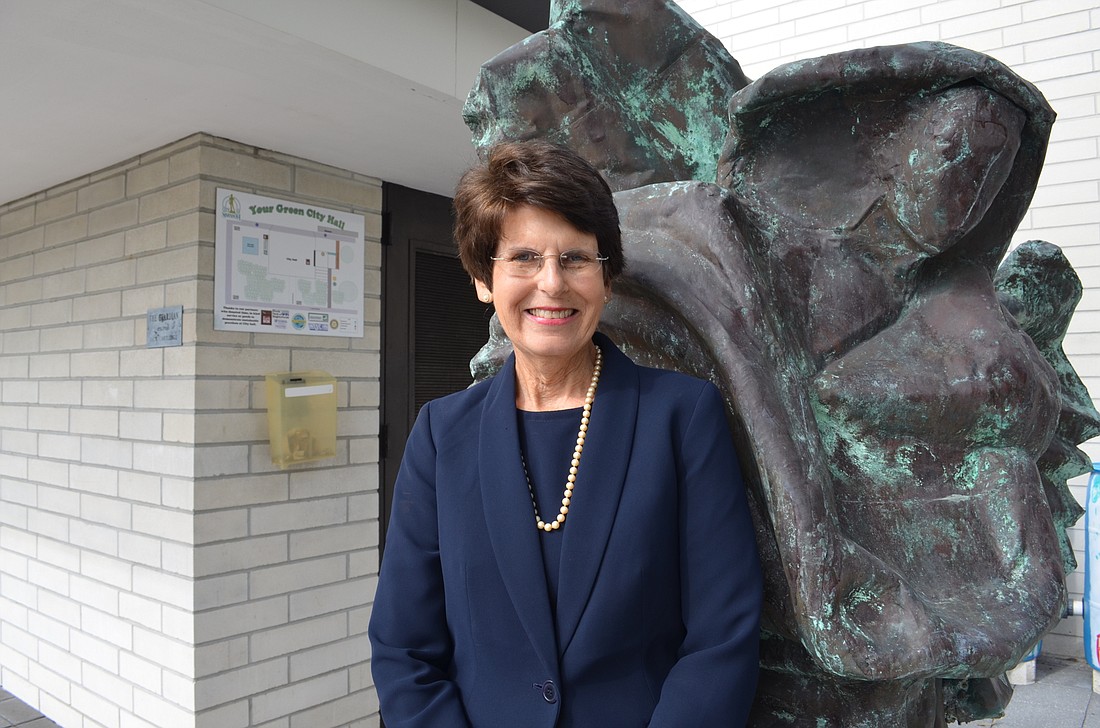- April 25, 2024
-
-
Loading

Loading

City Commissioner Susan Chapman has been a target of criticism during a lawsuit that alleges she violated Florida’s Sunshine Law, but today, a court ruled in her favor for the second time.
The Second District Court of Appeals issued a unanimous decision affirming the initial ruling of Sarasota Circuit Court Judge Brian Iten. In 2016, Iten concluded Chapman had not violated the Sunshine Law.
The case is centered around a 2013 meeting at Tsunami Sushi & Hibachi Grill. Chapman and Commissioner Suzanne Atwell both attended a meeting with downtown officials on the topic of homelessness. Neither commissioner spoke at the meeting, according to those in attendance, but the nonprofit group Citizens for Sunshine alleged their presence at the meeting constituted a Sunshine violation.
City Attorney Robert Fournier called the lawsuit an attempt to expand the scope of the Sunshine law, but officials were split over whether the city should pay to defend Chapman. Since the lawsuit was filed, multiple City Commission candidates have pledged to end payments toward the suit, which now total $390,493.22.
Chapman and her attorney, Thomas Shults, called Tuesday’s ruling a conclusive finding that the suit was not justified.
“We were listening to their concerns,” Chapman said of her attendance at the meeting. “That’s what’s been suppressed — the right of the people to have their elected officials, in an unfettered manner, listen to their concerns.”
Chapman has alleged the lawsuit was a targeted attempt to attack her for her opposition to a come-as-you-are homeless shelter. She said the focus on the expenses was an effort to distract from its frivolous nature.
“They stopped, early on, talking about the merits of the case, and it was only about the costs of the case,” Chapman said.
Michael Barfield, a legal consultant working with Citizens for Sunshine, denied Chapman’s claims regarding the merits of the case. He also denied that the two rulings in Chapman’s favor represented a victory for the commissioner. He said that, because the appeals court did not issue a written opinion, it did not establish a definitive precedent regarding whether similar meetings constituted Sunshine violations.
When asked if Citizens for Sunshine would consider filing suit if another meeting happened with similar circumstances as the 2013 meeting, Barfield said “absolutely.”
“Which is why we believe it’s important for a binding precedent to be established on this question, one way or another,” Barfield said. “The issue is capable of repetition.”
Chapman, Shults and Fournier all disputed the claim that a written opinion is necessary. Shults said the written opinion from Judge Iten, affirmed by the appeals court, would be the applicable decision going forward. Fournier said Tuesday’s ruling rejected Citizens for Sunshine’s expanded interpretation of the law.
“I think anyone arguing this decision does not settle the issue has a tough way to go,” Shults said.
Still, Barfield is not deterred from his belief that Chapman violated the Sunshine Law. Citizens for Sunshine has 15 days to file a motion for a rehearing, after which the court could decide to issue a written opinion. Barfield said the group plans to ask for a written opinion. If its request is granted, Citizens for Sunshine plans to appeal the case to the state Supreme Court.
“Given how long this case was, and how thoroughly litigated it was and that taxpayers spent a bunch of money, we think a resolution is warranted,” Barfield said.
Chapman said the pursuit of a written opinion was another sign Citizens for Sunshine was only interested in prolonging the case.
“They just want to appeal forever,” Chapman said. “Their No. 1 issue is how to keep the case alive to keep fees going against me, so they can use it against me.”
Based on the appeals court’s ruling, Fournier said it was unlikely Citizens for Sunshine could get a written opinion. At the next City Commission meeting, he plans to revisit the city’s procedures for when multiple commissioners attend — but do not speak at — the same meeting.
Before the case was filed, the city did not notice these meetings, which Chapman has pointed as evidence she was following standard protocol. After the case was filed, the city noticed those meetings and sent someone to take minutes as a precaution. Now, Fournier said he believes the city can end that practice.
Barfield still believes multiple commissioners attending a private meeting at which matters reasonably foreseeable to come before the City Commission constitutes a Sunshine violation. He pointed out that Iten did admonish Chapman for inviting the appearance of impropriety. Barfield rejected the notion that his interpretation would be too onerous on the city and local organizations.
“How hard is it to notice a meeting and take notes as to what occurred?” Barfield said. “It’s not hard. It’s part of the process of transparency.”
Chapman disagreed with the idea that Citizens for Sunshine was making a reasonable request.
“To be falsely accused and have your reputation destroyed — that’s pretty onerous,” she said.
This article has been updated to correct the spelling of Thomas Shults’ name.